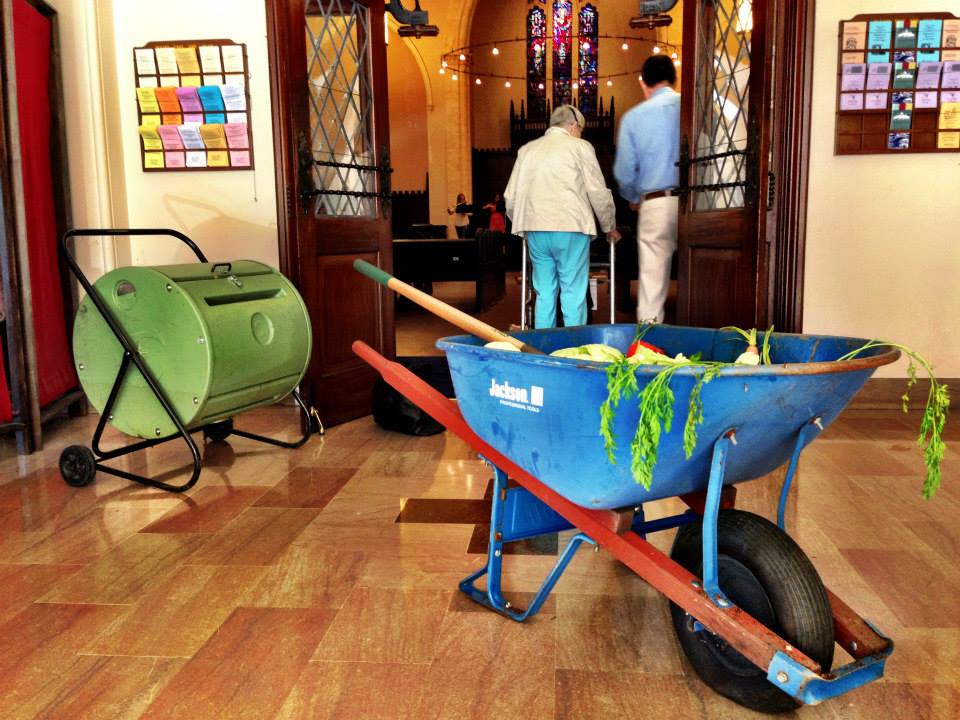Written by Ashley Goff and Rebecca Barnes
During this liturgical season that the Church of the Pilgrims calls “Homecoming,” the Sundays between September and the end of November, we are focusing on the theme of Food and Faith. Within the theme of Food and Faith, we are taking on this arc for a focus: humus, exile, and harvest. To fully experience this theme we are having communion each week in worship.
The inspirations for this theme of Food and Faith is Sacred Greens, Pilgrims’ urban garden which produces food to supplement meals for Open Table (our Sunday lunch for hungry neighbors). The book “Food and Faith” by Norman Wirzba has also been influential.
The first few weeks we are naming the element that formed our existence: soil. From a theological perspective, we are lifting up the Biblical interpretation that we are formed out of the humus, or topsoil, and it is from that place where the earth creature took it’s shape.
It was important to us to have visual symbols of the role of compost in our lives–that the life and death cycle of nature is indeed part of our earthly existence. We filled a wheelbarrow with compost and scraps of veggies and fruits to symbolize the initial stage of compost. This rested right outside our interior sanctuary doors.

This wheelbarrow sits outside the sanctuary doors full of compost and veggie scraps. The compost bin is there for people to dump their compost. We are inviting folks into a “Food and Faith” practice each week and the first few weeks have been composting—save your compost and bring it to church to dump in bin.
From wheelbarrow to table, we laid out the transformation process of soil, showing that our own essence is one of life and death, transformation and change. Right inside the sanctuary, our baptismal font was filled with compost and food that was in the process of decomposition–showing off the mold and fermenting stage.

This is the font—right when you walk through the doors of the sanctuary, passing by the wheelbarrow and compost bin. The visual trajectory is to start at the wheelbarrow with initial food scraps, walk past the font with the decomposing food, and then see the compost with the fully composted materials.
Then your eyes go to the communion table. To create a sacramental experience of soil, we’ve taken our garden compost to create our communion table. We’ve given our regular communion table a break by creating a table out of hollow acrylic legs and a rustic table top. The legs were filled with compost. As Pilgrims moved themselves to gather around the table, our music director droned on the cello, creating a sound of the murmuring deep, the belief put forth by Aviviah Zornberg that creation came not from a void but from chaotic matter murmuring in the deep. From that murmur, order was created. Pilgrims sprinkled compost around the table, releasing their sacred essence back onto the floor.
Our second and third Sunday for our humus focus, we skipped using a typical table all together and created a large pile of compost in the middle of the sanctuary. With pitcher, cup, and bread resting on top of the pile, we mindfully made our way to the table, again with the cello droning. Instead of standing, and giving the impression of humans looming over the soil, we sat on the floor during the Prayer of Great Thanksgiving and in the sharing of the cup and bread.
 In the upcoming Sundays for exile, we plan on focusing on our exiled state from our earthly existence and the profound disconnect we have as humans from the creation, and from the production, sharing, and ingestion of food. We plan on the table focusing on sackcloth and ashes to symbolically show the lament we have for a deeply broken planet.
In the upcoming Sundays for exile, we plan on focusing on our exiled state from our earthly existence and the profound disconnect we have as humans from the creation, and from the production, sharing, and ingestion of food. We plan on the table focusing on sackcloth and ashes to symbolically show the lament we have for a deeply broken planet.
In our harvest season, the table will be full of harvested produce to symbolize the hope and action we can take to restore the planet and ourselves to the process of creating and consuming food.
In addition to all of the above, we are also inviting people into weekly practices of baking bread, composting, and mindfully eating. Also, following the sermon each week, we are hearing a story of “alternative practices” about an individual or a community engaged in Earth-honoring ways around food. So far we’ve heard about EarthBrew, the Maryland compost company we use for our garden, and DC Honeybees, the Washington, D.C. non-profit focused on creating urban apiaries. Pilgrims is one of those apiaries.
Click here to read our sermons on this Food and Faith theme (those sermons start on September 8th) and follow us on Facebook as we post pictures and other insights from this compost-exiled-harvest filled season.
Want more information? Contact Ashley Goff, Minister for Spiritual Formation, ashley@churchofthepilgrims.org or Jeff Krehbiel, Pastor, jeff@churchofthepilgrims.org